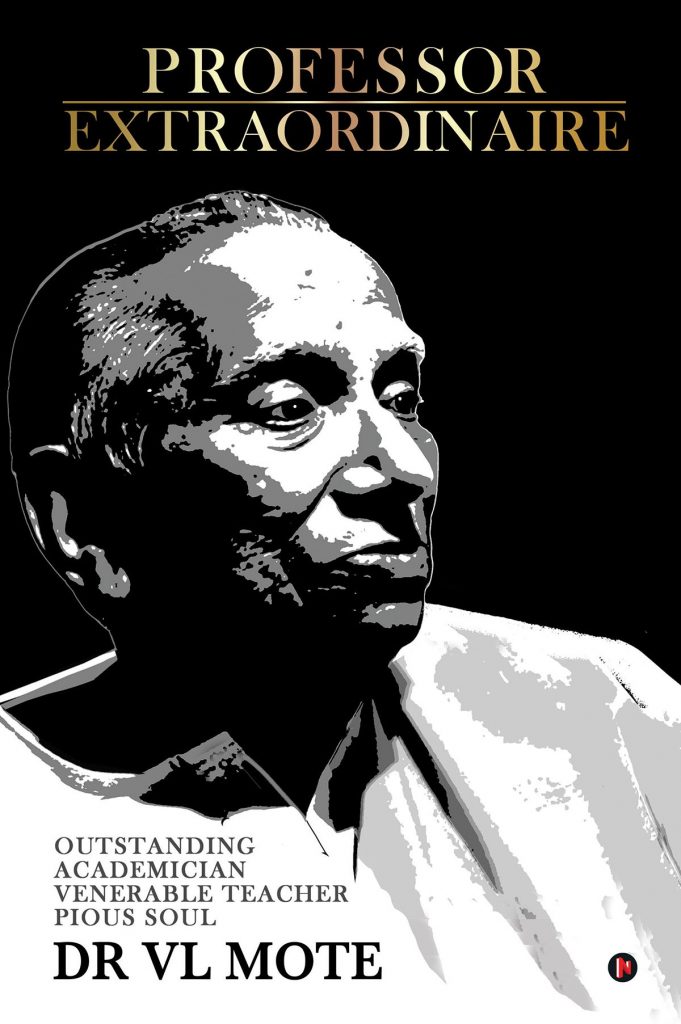
MEMOIR OF DR VL MOTE
PROFESSOR EXTRAORDINAIRE
OUTSTANDING ACADEMICIAN, VENERABLE TEACHER, PIOUS SOUL
On July 23, 2021, the 2nd death anniversary of Professor V L Mote, Mr Madan Mohanka and Prof Jahar Saha organized an online launch of the book ‘Professor Extraordinaire’ at the campus. Prof Chitra Singla hosted the event and Prof Errol D’Souza, Director of IIMA, released the book and presented a copy to Mrs Snehlata Mote.
The book is a tribute to Professor VL Mote, with a collection of articles, messages and eulogies from his peers, colleagues, students and family members.
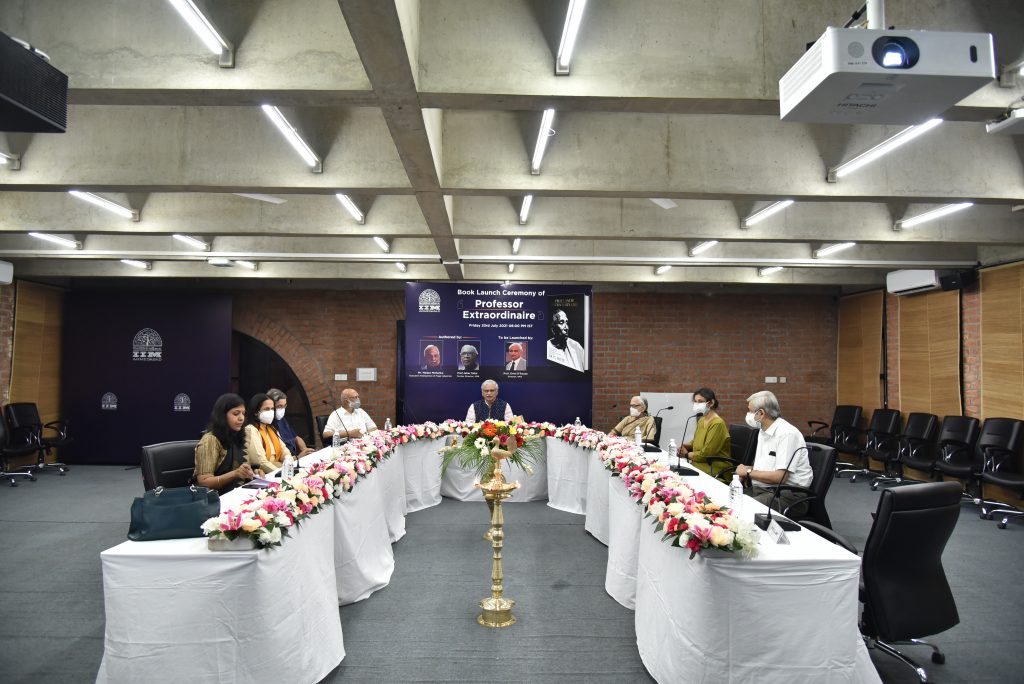
Prof Errol D’Souza welcomed the IIMA fraternity to the book’s launch, a special occasion remembering not only an extraordinary professor but also a person who, in his unique way, shaped IIMA. Prof D’Souza joined the Institute much after Prof Mote superannuated from IIMA. Since then, he said, “I have met him occasionally and known him well”. He fondly remembered their first interaction; “Prof Mote came to my office to say he liked the paper I had just published and discussed how to take it forward. Prof Mote was born in rural Maharashtra. As a youngster, he loved studying Sanskrit and Mathematics; he was weak in History and Geography; dreamt of becoming a Policeman or joining the Indian Armed Forces. Because of family circumstances, Prof Mote, however, could not fulfil this dream. He was fond of riding a motorbike he had when in school, although of low cc, and in Bombay during college, he had a good bike”.
Prof D’Souza had asked Prof Mote about his chalk throwing in classes. Dr Mote had seen a professor of Marketing at Harvard doing it. He liked it and started using it. It was a way to keep the students alert in the class, which, he thought, helped in learning. Prof D’Souza recollected how Prof Mote used to talk about the character as more important than intelligence. He recalled an incident that Prof Mote had narrated. In a consulting assignment with a reputed textile mill in Bombay, when Prof Jahar and Dr Mote arrived at the hotel, Dr Mote found that the client had left a bottle of expensive Scotch whisky for them. He contemplated what they should do with it, and finally, while leaving, he returned the bottle. Prof Mote was concerned that accepting such gifts from a client would affect his independence as a consultant. Such was the values he talked about and practised! Prof D’Souza narrated another discussion about Prof Mote’s tenure as the first PGP Chairman. Prof Mote described it as full of tensions. At the end of the first year, quite a few in the first batch did not qualify to get a promotion to the second year, and the PGP Committee asked them to leave the programme. The students went on strike. Some Board Members intervened, and the Institute compromised the faculty decision. Prof Mote still wondered whether we gave a wrong signal to academic standards. Prof Mote lived by values he believed in.
Mr Madan Mohanka (PGP 1967) welcomed all to the launch event. He mentioned, Dr Mote was known for his demand for discipline, sincerity, perfection in every aspect of life, and his uncompromising attitude and strict belief in his values. Many have suffered from the flying chalk and dusters in his classroom, for which he was famous! Mr Mohanka shared an incident to illustrate this side of Prof Mote. Early in PGP, he and his friend went to him to request a tutor for the Management Accounting course. His response was, “I will throw you into the ocean, whether or not you know how to swim. If you want to survive, you will learn to swim. Otherwise, you will drown! You can leave now.” This uncompromising attitude, Mr Mohanka added, was Dr Mote’s way of getting the best out of his students, and that is why he became such an excellent teacher and a great leader. Though outwardly very hard, Dr Mote had, Mr Mohanka said, the heart of gold, very soft in the core. Mr Mohanka noted how Dr Mote broke down to tears at the tragedy of a poor farmer who had significant financial losses when two of his cows fell sick. Later, he requested Mr Mohanka to give the farmer some monetary help. Dr Mote started crying after ‘kanyadan’ at the wedding of his eldest daughter Bhagyashree. He was different. Dr Mote had dedicated his PhD thesis to his parents and on his return from the USA, as he met his mother, he bowed and placed his PhD certificate at her feet, saying that it was the best gift he could bring for her.
Prof Srikant Datar (PGP 1978) shared that he was one of the several students who followed Prof Mote’s footsteps. He learnt three things from his interactions with Prof Mote. First, he acquired a general management orientation and learnt that the thrust of IIMA education was general management. Any problem we do not examine from a narrow perspective. We study an issue from broader angles. Second, he learnt what the purpose of any research should be. Being from core areas of Mathematics and Statistics, Prof Mote would be thrilled with the rigour and elegance of a method to resolve any problem faced in practice. He, however, believed that the core purpose of any research is to ask: how would it affect the way we currently do the activity? Would the study lead to finding a better course of action? Would our customers benefit from the study? How would society benefit from what we may see from our investigation? Third, Prof Datar got to learn all about mentorship. Prof Mote had a remarkable ability to think about others, an essential quality to become a mentor. Srikant ended by referring to his observation during IIMA Golden Jubilee Celebration. Many alumni paid tribute to Prof Mote, listening to which he was visibly emotional. Prof Mote, in his presentation, said, “I often wondered whether joining academics was a wrong choice. I indeed sacrificed financially. But I could not have got such love, affection, recognition, and respect and made such a contribution to society in any other job through my students. Today I am convinced that joining academics was the right choice for me”.
Mr Vindi Banga (PGP 1977) said that Prof Mote was not just an extraordinary professor. As evident from the book’s title, he was an extraordinary human being. He said there are very few who happened like him or will happen in future. Dr Mote did not just teach but touched his students in so many ways. Mr Banga remembered that attending Prof Mote’s class was like being on a stage. Prof Mote was the principal actor who could co-opt anyone on the scene. Dr Mote would ask a barrage of ‘surprising and searching’ questions in one direction on the issue to be dealt with in the class, which might change to another to the third direction. One purpose was, of course, to assess how well prepared the chosen actor was for the class. More importantly, the purpose was to take the person, in 360 degrees way, around to the issues to discuss in the class. Mr Banga said Prof Mote was taking us through a thought process to help us deal with unstructured problems we would face on our job in the future. Prof Mote epitomized not only elegance but also excellence, and learnt whatever he took up through hard work. He wanted us to learn and become better thinkers.
Mrs Snehlata Mote, Prof Mote’s wife, said that Prof Mote’s demise was sudden. She and the family felt devastated. The news of his death spread soon, and they started getting emails from friends, colleagues and students, from the sixties to later years. The information of his passing away appeared on social media too. Many students wrote about his teaching and his contribution to their learning. Mrs Mote said the family was overwhelmed and touched. They realized that Mote had a special place in all of them, which gave them comfort in their grief. She took this opportunity to thank all of them. Mrs Mote expressed gratitude to Mr Madan Mohanka and Dr Jahar Saha for bringing out this book. She thanked all those who were associated with the book and organizing the event.
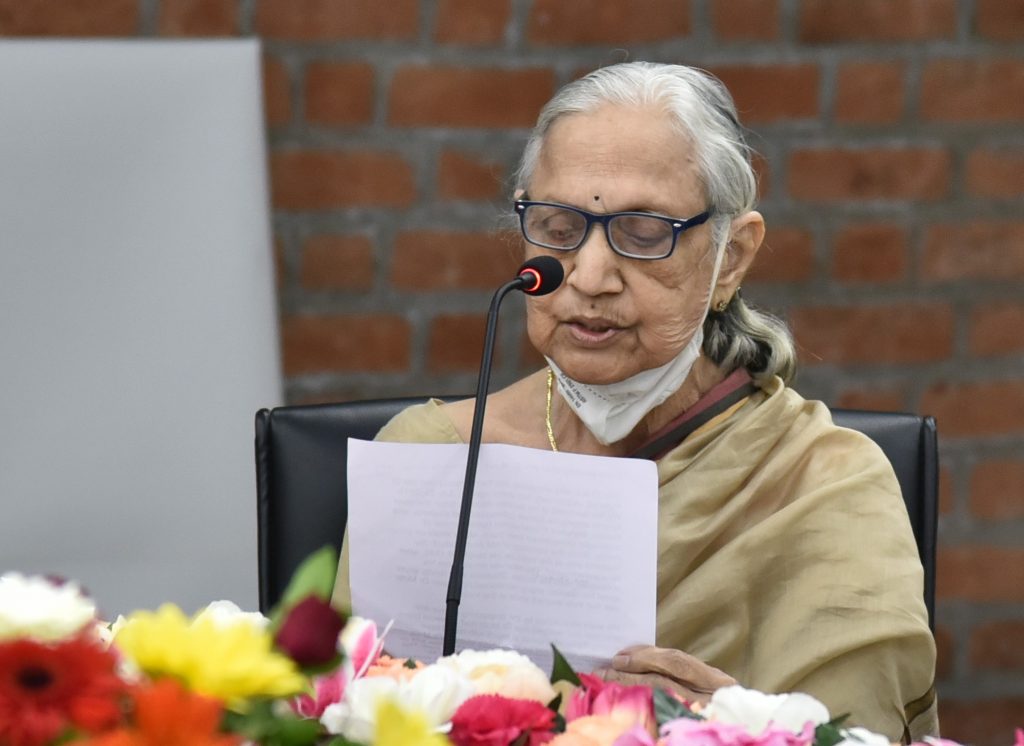
Shri Prafull Anubhai was a former Visiting Faculty Member, former Board Member of IIMA, and Founder Chairman Board of Management of Ahmedabad University. He remembered Prof Mote as a teacher who was concerned about how he could help students learn better and add to knowledge to solve better the problems faced in practice. He was a pioneer in using concepts of Mathematics and Statistics in resolving some problematic practical issues. Professor Mote was a keen observer of how people behaved and humorously documented many of them. The thrust was, however, on underlying lessons in management. One such example was his observation in a tea shop in Ahmedabad. Shri Prafull Anubhai mentioned – two guys came on a cycle to the tea shop. One guy, as they enter, tells the owner sitting at the counter, “Please keep an eye on my bicycle”. While sitting, one calls a waiter and says, “Switch on the fan, get a glass of water and bring a copy of today’s newspaper”. The man then orders one cup of tea and two tea plates. While leaving, he tells the owner, “Add this amount to my dues”. Shri Prafull Anubhai called this an indigenous customer relationship, not what we learn in western concepts of customer delight. To him, Dr Mote was an outstanding professor and a pious soul.
Prof Abhinandan Jain (PGP 1970 and FPM 1974), worked on his FPM thesis under the guidance of Prof Mote. He mentioned the terror of the MSM course, primarily associated with Dr Mote, although he did not take MSM from him. Prof Jain took second-year courses from Prof Mote because he believed that they would be of high learning value. Prof Jain mentioned that he chose Prof Mote as his thesis guide, and Prof Mote accepted him as a doctoral student. Dr Mote was demanding and would not agree on anything as impossible. Prof Jain said, once he discovered an essential paper for his thesis, it was in French. Prof Mote would have liked him to learn French to read the article! He was, however, satisfied when Prof Jain got it translated into English. Dr Mote was helpful. Prof Mote gave him time whenever and as much he needed. They, however, mainly met in the night, sometimes continued beyond midnight. They used to have packets of cigarettes and many cups of tea! Prof Jain fondly remembers the impact Prof Mote has made on his way of thinking. What problem, what choices, what skills, what attitude in resolving an issue!
Shri PD Rai (PGP 1978) remembered Prof Mote as one who taught him in PGP. He considered him unparalleled in how he spoke to them and his efforts to ensure their learning. He was a very special human being. He was rooted in Indianness. He helped those who needed help. Shri Rai talked about how Prof Mote assisted Mr Mohanka whenever he sought his help in making Tega grow as an Indian Multinational.
Prof M Raghavachari fondly recollected Prof Mote as a very close friend. He described working with him in designing the P&QM area curriculum. The concern was what quantitative courses to teach management students and how to deliver to benefit them in their profession. Prof Mote contributed to bringing an applied orientation in the studies without sacrificing the rigour in the thought process. Prof Raghavachari mentioned Prof Mote’s research orientation. They worked together on many issues and published papers in professional journals. He referred to Prof Mote’s values and he did not compromise on them. Once Indian Airlines did not honour their confirmed tickets on a flight, which happened because of their practice of overbooking. The airlines would have returned the fare. Prof Mote believed that overbooking was not the correct practice and the airlines should discontinue it. He went to the court and won. The airlines stopped the overbooking. Prof Ragahavachari remembered him as a good bridge player, and often they were playing together. They were close family friends.
Shri Sanjay Lalbhai, Chairman Arvind Mills, talked about more than thirty years of association with Prof Mote. Prof Mote was initially a consultant to Arvind Mills and, after superannuation from IIMA, he worked full time. He had in-depth knowledge of the Indian Textile Industry and a brilliant mind in strategy. He assisted in Arvind’s reimaging exercise. Sanjaybhai acknowledged the significant contribution of Prof Mote in Arvind, surviving as the only textile mill of 76 mills that used to be in Ahmedabad. Shri Sanjay Lalbhai considered Dr Mote to be his friend, philosopher and guide. He mentioned that he sent his sons to Dr Mote when they first joined Arvind Mills. Who could be a better mentor for the young minds than Prof Mote?, Shri Sanjay Lalbhai said.
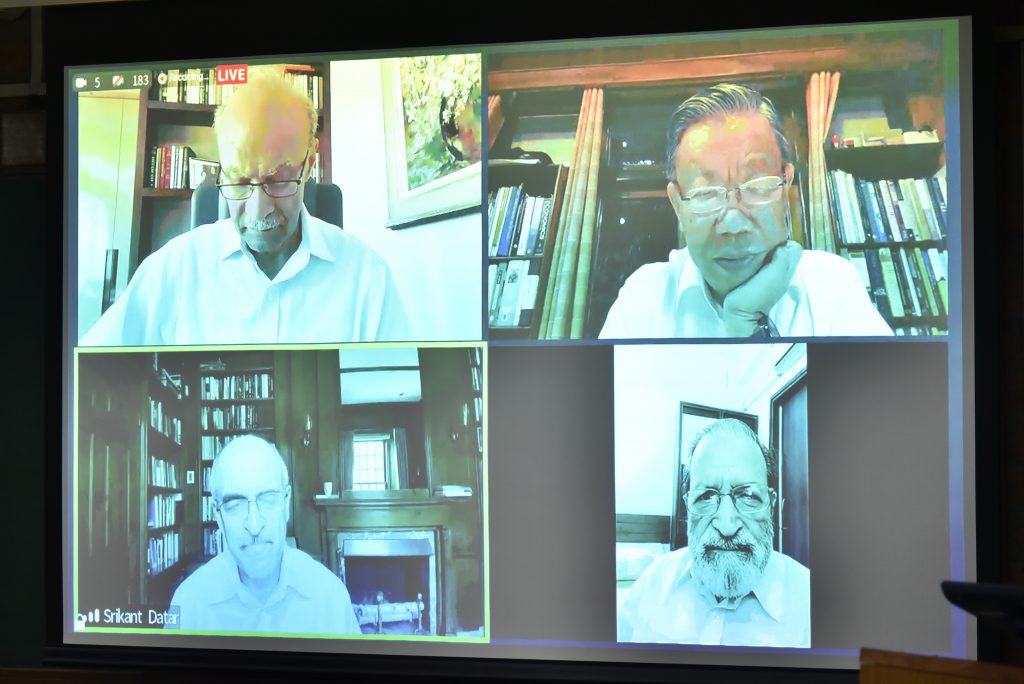
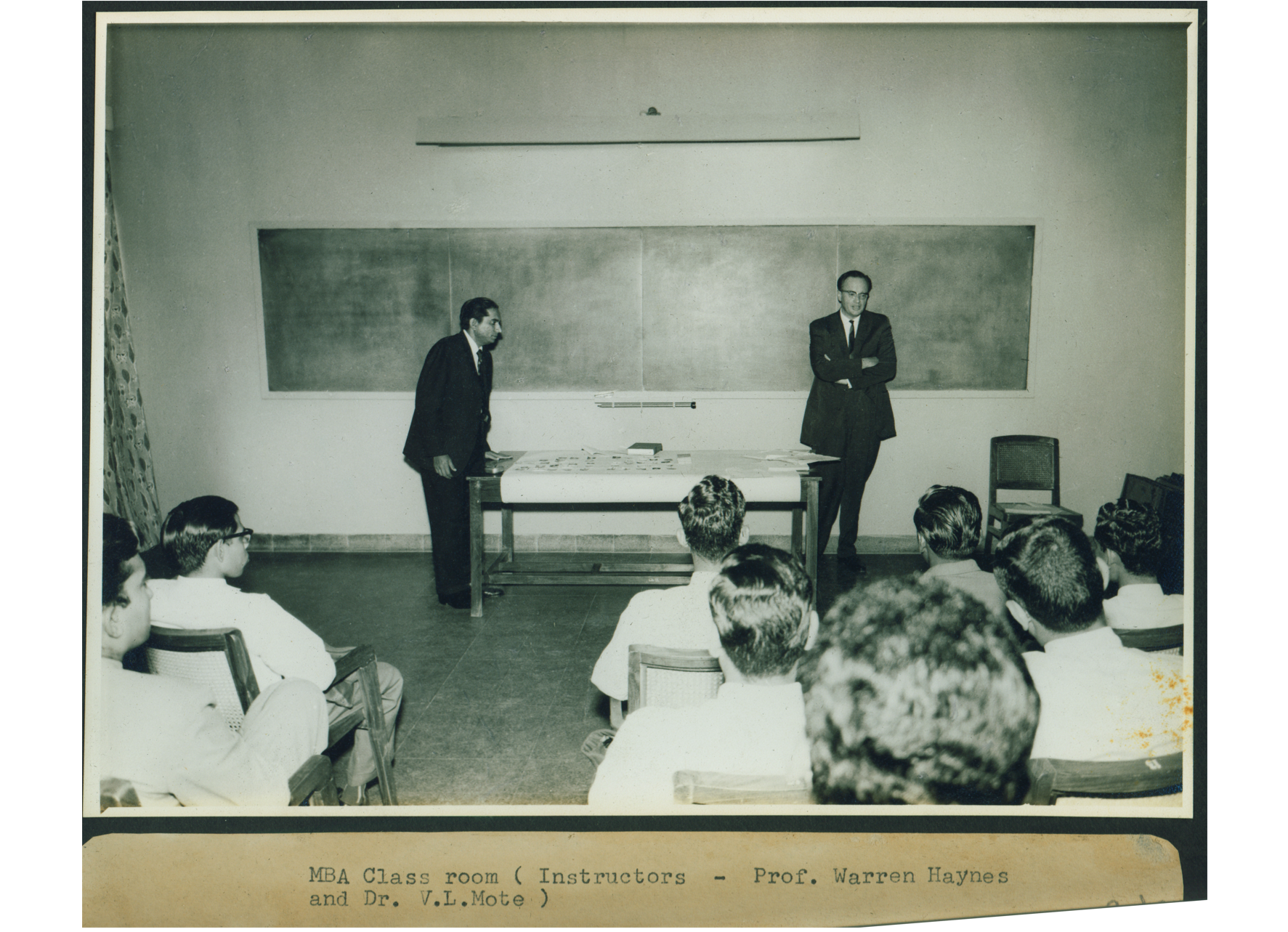
MY AJOBA, NOT FAMOUS OR RICH BUT SUCCESSFUL
Manjari Sowani, Prof. Mote’s granddaughter
Even though he was 60 years older than me, Ajoba was more naive.
For example, when presented with a complex ethical problem, my solution was, “Bribe everybody.” My grandfather (Ajoba), who’d just spent three nights preparing his ethics case study, was horrified at my blunt dismissal of the issue. “Are you sure you understand? The man in the case, Mr. X, has created a superior, cheaper, and more environmentally friendly product. It will improve the life of the common man. It is in the government’s interest to adopt it. So why should Mr. X have to bribe a bureaucrat? He’s a man of honour. This is a real dilemma.”
“I just don’t see what’s so hard”, I said. “If I were Mr. X, I’d bribe everybody. Twice, if necessary.” – a typical after-dinner debate between him and me. He’d have a glass of beer in his hand, and I’d have my stomach full with my aji’s delicious cooking. Sunday nights were incomplete for me without a rousing debate with Ajoba over the state of the world.
Ajoba loved to talk long into the night about Dharma, Ethics and The Gita. Personally, I thought these things were very nice to talk about but not very practical. To me, the point of life is to improve your status, make money, and be happy. The problems of the world cannot be solved by one person, so why even try? Just go your route and enjoy your life, and if a beggar comes to your car at a traffic stop, roll up your window and look the other way.
This was Ajoba’s life: He lived in a middle-class house, had frugal habits, and spent all his time thinking about making the world a better place. He was the smartest man I knew. He was also extremely hard working – he woke up at 4 am every day and worked till the day he died.
But I wondered why he hadn’t done more. What was the point of being so brilliant and working so hard if you became neither rich nor famous? His own students had become Deans, and CEOs, and multimillionaires. So, it seemed strange to me that he was content with his relatively modest life.
The problem, I decided, was his tongue. Ajoba was famous for saying the wrong thing to the wrong person – which meant he said the true thing even to a powerful person. People in power don’t take kindly to those who want to speak the truth all the time. A little lying, or at least a creative interpretation of the truth, like a bit of bribery, is essential to succeed in the world.
It was a pity, I thought. For all his intelligence, my Ajoba couldn’t learn to be practical – and it cost him opportunities that could have made him rich and famous. What was the point of that?
And then, he died.
And then came the letters, one after the other, the phone calls and the text messages and the collective grief of the thousands of students whose lives he had touched – testaments to how he had changed their lives forever, for the better. Nearly fifty years later, they remembered him, and they loved him still. Then I learned of all the projects he had done, how he’d made the world a better place through his hard work. Things he’d never talked about because boasting wasn’t his way.
That was the point.
I thought he was naive, but really, he’d transcended his cynicism and circled back to wisdom. I think Ajoba realized that if there is any point to life, it must lie in trying to make the world a better place even if you know you won’t succeed.
My Ajoba was a dutiful husband, a good father, a fantastic grandfather and a legendary teacher. Till the end, he told the truth about the world as he saw it, never pulling any punches or sucking up to anyone. If an idea lacked merit, he didn’t mind insulting kings. If an idea had value, he’d befriend the pauper who suggested it. If a person needed help, he’d do everything he could to help them. If an issue needed solving, he’d throw his whole heart and soul into finding out solutions. He led precisely the life he wanted to, always.
He wasn’t rich, he wasn’t famous, but I haven’t yet met a man as successful as my Ajoba was.
TRIBUTE TO PROFESSOR VL MOTE
Prof Meenakshi Malya, highly remembered as the other ‘M’ in the famous MSM course taught at IIMA that stood for Mathematics and Statistics for Management but locally as Mote-Saha-Malya because of the faculty who taught it.
Prof VL Mote wanted to contribute to the development of the country. I was impressed. Once, I asked him, “If one wanted to contribute to the country’s development, how would one go about it?”
I realised he used the word ‘Excellence’ very often – Excellence in Teaching, Excellence in grading, Excellence in Research – Excellence in Everything we do. For example, to achieve Excellence in grading, after we have stated the unambiguous answer to each question and said how we would judge the quality of a solution, he brought the notion of cross grading to achieve Excellence in grading. Dr Jahar Saha, he and I would evaluate every paper independently in all the courses we taught together. In one year, we offered MSM-I and a set of second-year courses jointly. All of us would independently grade every single paper or exam or surprise quizzes and things like that. Very time-consuming. Convincing each other in case of differences is another issue. Why had we done this way and not the way he did? Then, he would very patiently tell us, “See, you missed this point or that point, you didn’t realise that if you did this, you have to consult the marketing manager, so you have to know marketing also.”, and all that.
So, I was very impressed, then realised that the way he lived was the philosophy of his life – Excellence. For example, I was and still am pretty untidy about my attire, my hairdo and things matching or not. But, for Dr Mote, everything was perfect, his attire – every day the same fully ironed black trousers, white shirt, long sleeves, not a hair out of place, and he was in time for a class, not even one minute late.
So, I realised that somebody made a serious attempt to live life as perfectly as possible. He believed that he has to do work entrusted to him the best possible way, the way he thought the right way.
I feel that is the main profile for Dr Mote.
He had a great sense of humour; also, he would crack jokes. If he found a student’s attention was wandering (IIM classrooms like galleries), he would break chalk into small pieces and throw one to the student. He had a perfect aim; he was a good cricketer, a medium pace bowler. So, the chalk piece would generally hit the target.
We were in a team – Jahar, Dr Mote and me, but he was the leader, the Chairman, well versed in all fields of management, and Vikram Sarabhai trained him. When Dr Mote was PGP Chairman, he thought we probably were giving too many class assignments to students simultaneously, that they would run short of time. He expressed this concern to Dr Vikram Sarabhai. Vikram Sarabhai replied that he often runs short of time, but he practises to get up 1 hour earlier and go to sleep a few hours later than the usual time to get 3-4-5 hours of extra time.
Vikram Sarabhai quietly motivated staff to work harder and for longer hours and inspired the team to do the same.
It was an exciting and hard-working time, but I am glad he made us do that. I meet students now, who say that our way of impressing them even in day to day life helps, and that’s what we are supposed to do.
He taught us that taxpayers are paying, so we have to be honest with ourselves and them.
He lived with the philosophy of Excellence. I asked him once if he believe in god, and he said “Yes”. Dr Mote lived on both the dharmic and worldly (industrial society, for example) side of life.
Dr Mote didn’t mind helping people. He encouraged youngsters like Jahar in simple ways. Once, Dr Mote said to Jahar, “You don’t look happy about what happened.”. Jahar said, “If I follow your instructions and document that for my thesis, how will it be my research, and how will I say that I have earned my degree? I will be a parrot!” He was very impressed with Jahar’s frankness, so he said, “Take time off and do what you want”. Jahar told me that he discovered what he was looking for. He submitted his thesis and got an M.Stat degree.
Dr. Mote was the most inspiring person if one takes one’s aims seriously.
I missed him when he passed away.
VL MOTE – HE WILL BE REMEMBERED FOREVER
Mr Sanjay Lalbhai, Chairman and Managing Director of Arvind Ltd
In the early 80’s, I was looking for an individual who would help us at Arvind with long-term strategic vision. Dr. Mote’s name came up for consideration as he was among one of the passionate and well informed individuals in the textile sector. I invited him and he readily accepted to consult with Arvind.
Dr. Mote was involved with the entire process of reimagining Arvind and as a testimony to his ability, it is abundantly clear that Arvind was among the only composite units which survived the onslaught of power looms. If I remember rightly, Dr. Mote came on as a consultant from around 1984 to 1992 and once he retired from IIM in 1993 he took up a full-time assignment with Arvind. Over and above strategy, he was most passionate about corporate social responsibility and he spearheaded Arvind’s foray into urban social responsibility, leading our thrust of engagement with society. This started way before the government mandated companies to compulsorily allocate funds for CSR. He started SHARDA (Strategic Help Alliance for Relief to Distressed Areas), raised funds and made a huge difference to the lives of children studying in municipal schools and living in slum areas. He ran a parallel schooling programme providing supplementary learning support to children up to the eighth grade and then finally took them all the way up to the twelfth grade.
He pioneered the unique project, in 1995, of up-gradation of a slum named Sanjaynagar, where Arvind came up with a model which could dramatically improve the quality of life of inhabitants of that slum. This project where three parties, the municipality, Arvind and the beneficiaries, all came together to overhaul the living conditions of a slum was widely acclaimed by the likes of WHO and Dr. Dwijendra Tripathi has written a case study and a book on this innovative undertaking. Many years after the Sanjaynagar project was completed, the government allowed corporates to acquire land of slum dwellers and build high-rise buildings in exchange for FSI to be given to the developer. It was very heartening when Arvind approached Sanjaynagar dwellers, they unanimously agreed to the proposal Arvind put forth and the area was thus transformed into a modern housing colony. Usually, the agreement of 70% members is adequate for a project to be undertaken but in Sanjaynagar 100% of the people agreed. This is testimony to the goodwill Dr. Mote had created among the Sanjaynagar residents.
Dr. Mote was a perfectionist, a hard taskmaster, yet a very compassionate individual. He believed very deeply in our ancient Indian philosophy and always applied its wisdom to day to day life issues. Whenever he put forth a view, a presentation or a speech he would quote from our ancient texts and show us their wisdom and relevance in today’s life. The last twelve years he spent hundred percent of his time on projects executed under SHARDA trust and writing his book on mathematics. He gave his hundred percent to Arvind because he was passionate about Arvind’s vision and values. He worked at Arvind in various capacities, initially starting as a consultant and then becoming a Director on the board. But his individual commitment to Arvind was lifelong. For me it was a rare privilege to have worked with him…he was in a true sense, my friend, philosopher and guide.

